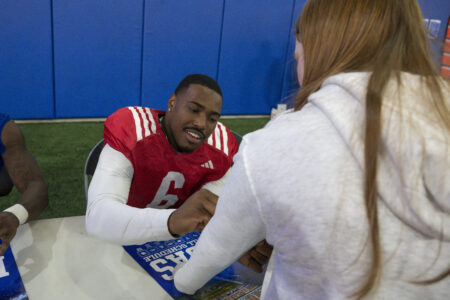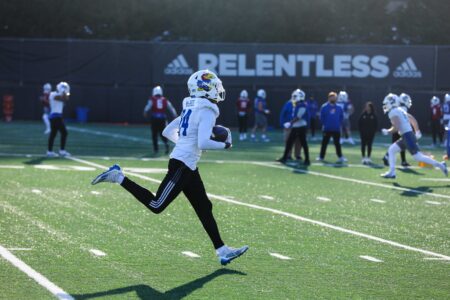Reasons for skid plentiful
Overshadowed by the head coach’s unusual two-week walk on the plank was the collapse of a Kansas University football team that won its first five games and lost its last seven.
How did it happen?
For-the-moment Kansas coach Mark Mangino came close to putting his finger on it after Saturday’s season-ending 41-39 loss to chief rival Missouri.
“I think a number of things,” Mangino said. “Lack of depth on defense. Playing with a quarterback several games who was not 100 percent. He could play and didn’t have a chance of re-injury, but weight transfer throwing the ball, things like that, were an issue. I never made excuses, and neither did he. But you asked a question, and I’ve got to answer it.”
Finally, Mangino answered the question about quarterback Todd Reesing’s health. If he had answered it several weeks ago instead of adhering to an injury policy the athletic department never should have let him get away with in the first place, think of all the trouble he would have avoided.
It should have been obvious to everyone that Reesing was hurt, and when two weeks after suffering a groin injury that he revealed after he was removed from the Texas Tech game, it all made sense. Reesing lost his ability to scramble and was throwing balls into the dirt. Conspiracy theorists looked for deeper meaning. Some blamed it on Mangino cursing him by hyping him for the Heisman Trophy. Others wondered if Reesing was freaking out because the end of his career neared. Mangino was blasted for “benching” Reesing against Texas Tech.
I never bought into those theories and always thought his struggles were injury-related. Mangino easily could have made the rest of the world believe the same, but until Saturday didn’t acknowledge the injury impaired Reesing’s performance. In doing so, Mangino did a disservice to himself and his quarterback.
An overmatched offensive line that performed poorly in the first four weeks of the losing streak also played a part in Kansas falling far short of expectations. Once the coaches surrendered the dream that Jeff Spikes could become another Anthony Collins and shifted him from tackle to guard, a position more befitting feet not nearly as quick as Collins’, the line improved.
Recruiting deficiencies left the Kansas defense without a linebacker either experienced or talented enough to start for a Big 12 team. The front four sometimes applied pressure from the edges by Jake Laptad and Maxwell Onyegbule, and the search for an effective defensive tackle uncovered John Williams, shifted from the offensive line. He was probably better than the rest, but there wasn’t enough else. Cornerback was a revolving door, never a good thing for a confidence-is-nearly-everything position.
The weak nonconference schedule created the misperception that Kansas had more talent than it did. That won’t be as much an issue a year from now with a road game against Southern Mississippi and a home game vs. Georgia Tech.
Once Reesing returned to health in the final two weeks of the season, though both games were losses, Kansas proved it was better than a 5-7 team, but it never was good enough to be ranked No. 16 in the nation, as it was five weeks into the season.







